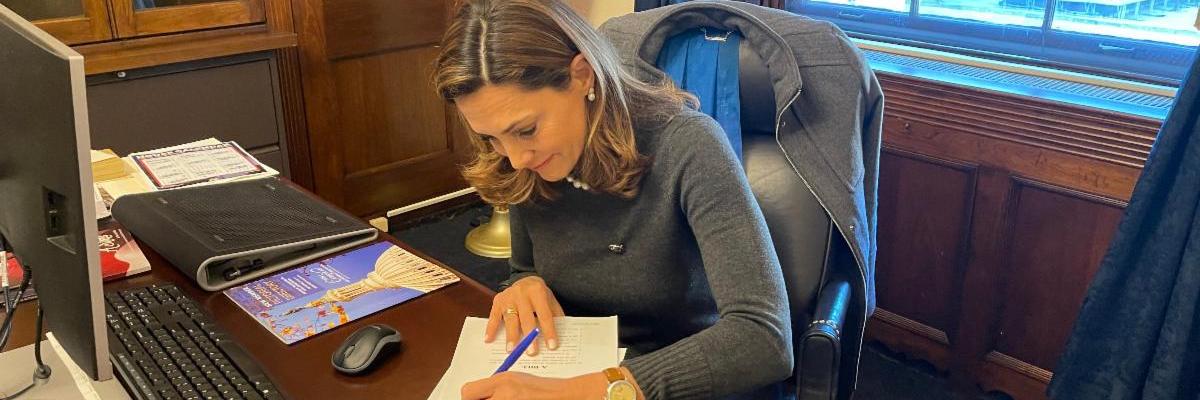Congresswoman Salazar Introduces Haiti Economic Lift Program (HELP) Extension Act

WASHINGTON, D.C. — Yesterday, Representative María Elvira Salazar (R-FL) and Representative Frederica S. Wilson (D-FL) introduced the Haiti Economic Lift Program (HELP) Extension Act. Senators Marco Rubio (R-FL) and Bill Cassidy (R-LA) introduced the companion bill in the U.S. Senate.
The HELP Extension Act extends several beneficial U.S.-Haiti trade provisions from the Haitian Economic Lift Program (HELP) for an additional 10 years, providing a critical source of formal employment for Haiti through the textile industry.
"In 2021 alone, the Haitian people have suffered a devastating earthquake, the assassination of their president, emboldened criminal gangs, and an ever-growing economic crisis," said Congresswoman Maria Elvira Salazar. "The HELP Extension Act will allow the Haitian people to improve their livelihoods and rebuild their country by ensuring the 60,000+ Haitians in the textile industry continue to enjoy the benefits of unfettered trade with the United States. As one of our closest allies in the Western Hemisphere, we have an obligation to ensure the wellbeing of our Haitian neighbors. That is why I am proud to introduce this crucial bill."
"I am incredibly proud to be a lead co-sponsor of the Haiti Economic Lift Program Extension Act, which will help boost the Haitian apparel industry’s economic stability and is sorely needed in a nation where there is so much economic and political insecurity," said Congresswoman Frederica S. Wilson, who represents one of the largest Haitian communities in the United States. "Apparel exports represent a significant portion of the nation’s exports and have created tens of thousands of jobs. This extension will create even more."
“As Haiti continues to confront political corruption, natural disasters, and rampant crime, it is clear that it is in our national security interest to support our regional neighbor,” Senator Marco Rubio said. “This bipartisan bill will help strengthen Haiti’s economy and benefit the U.S. by decreasing our nation’s dependency on goods manufactured with forced labor in China. Our mutual benefit will encourage safety and prosperity in our hemisphere.”
“Families in Haiti are desperate following repeated natural disasters and unrest,” Senator Bill Cassidy said. “Extending trade benefits is good for the U.S., provides the starving Haitian people with needed resources, and will help stem the exodus from the island.”
The HELP Extension Act is good for the U.S. economy and our national security, will help improve the livelihood and opportunities for the Haitian people, and will prevent regional manufacturing jobs from going to China. The bill will help provide a stable economic foundation, which is also key to preventing the recruitment of young Haitians into criminal gangs which have taken advantage of the current instability in the country.
List of original cosponsors:
- Representative Frederica S. Wilson (FL-24)
- Representative Rick Crawford (AR-01)
- Representative Carlos Gimenez (FL-26)
- Representative Mondaire Jones (NY-17)
- Representative Greg Murphy (NC-03)
- Representative Brian Fitzpatrick (PA-01)
- Representative Stephanie Murphy (FL-07)
- Representative Mario Diaz-Balart (FL-25)
- Representative Louie Gohmert (TX-01)
- Representative John Rutherford (FL-04)
To read the full bill text, click here.
BACKGROUND:
Textile and apparel imports from Haiti to the United States make up over 90% of total imports from that country and represent approximately 11.5% of Haitian GDP. The textile industry in Haiti employs almost 60,000 people.
In response to an economic downturn in Haiti in 2005, Congress amended the Hemispheric Opportunity through Partnership and Encouragement (HOPE) Act to remove duties from Haitian apparel exports to the United States. Congress followed up in 2010 with the passage of the Haitian Economic Lift Program (HELP) Act in response to the 2010 Haiti earthquake.
HELP broadened the types of goods eligible for duty free status to over 5,000 types of apparel and footwear. Together, both HOPE and HELP apply to roughly 93% of Haitian exports to the U.S. and apparel factories in Haiti are a critical source of stable economic employment in the country. Both HOPE and HELP only offered these trade benefits until 2025. Congress needs to pass this legislation now in order to avoid a gap in the program which could arise from drawn out trade negotiations.
###